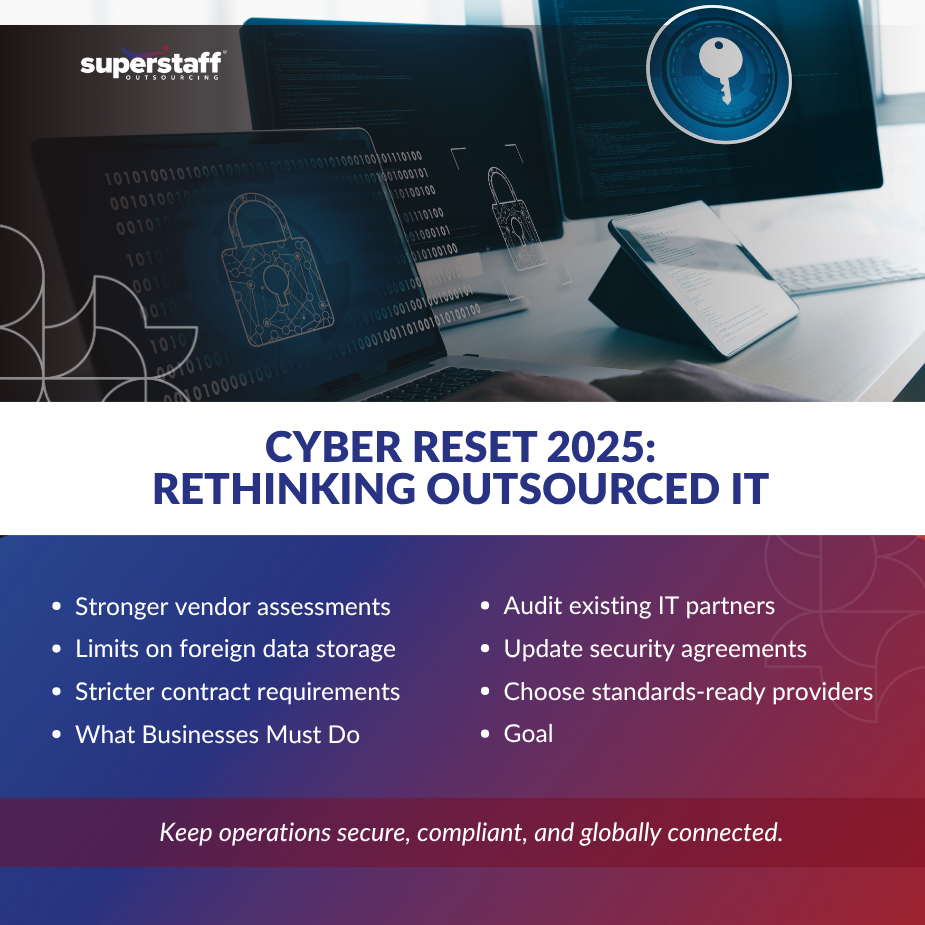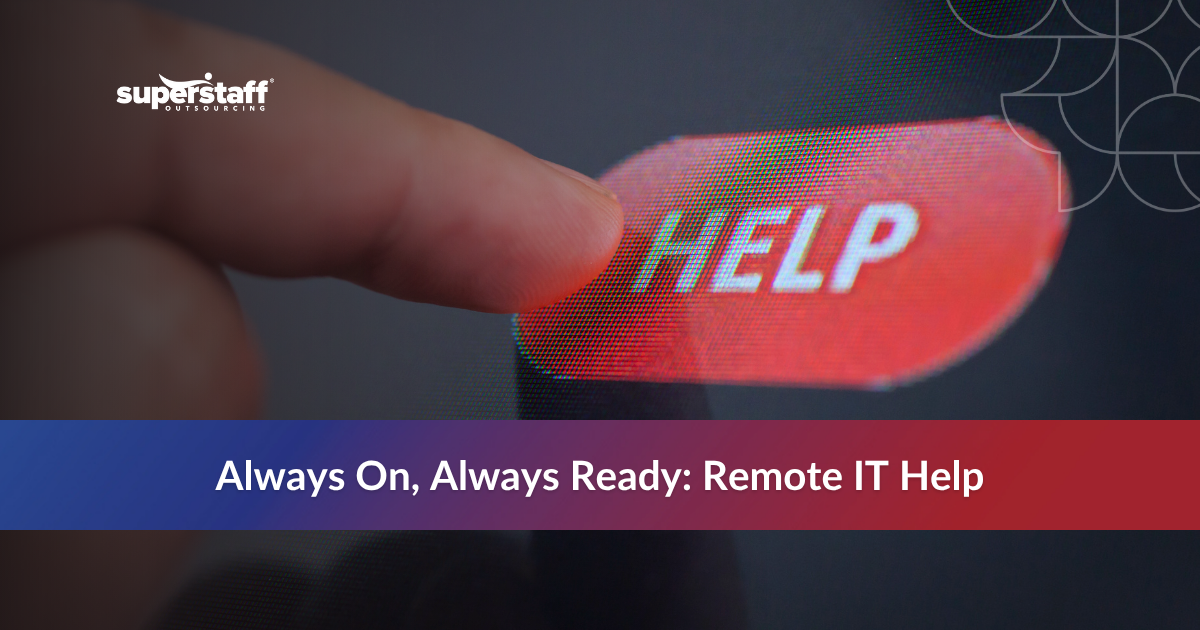
In 2025, President Trump signed an executive order aimed at strengthening the country’s cybersecurity policies. This move affects not only government agencies and contractors but also private companies that rely on outsourced IT operations.
Many businesses outsource IT tasks such as network management, infrastructure support, and data security to vendors based outside the U.S. These partnerships help reduce costs and increase efficiency. However, with the new policy in place, companies are now under pressure to rethink how they manage and secure their outsourced partnerships.
Understanding what Trump’s 2025 cyber reset means for outsourced IT operations is important for businesses that want to stay compliant while still benefiting from global IT support. This article breaks down the impact and offers steps for moving forward with more secure and reliable outsourced strategies.

Key Points of the Executive Order
The executive order focuses on tightening cybersecurity rules for both the public and private sectors. It introduces new limits, policies, and expectations around how U.S. companies work with external IT vendors. Here are the core elements:
1. Higher Security Standards for Federal Contractors
Any business working with the U.S. government must meet strict cybersecurity guidelines. This also applies to contractors using outsourced IT operations to deliver their services.
2. Limits on Data Stored Abroad
Companies must be careful where data is stored. Using IT providers in certain countries may now be restricted due to national security concerns.
3. Vendor Risk Assessments
Businesses are expected to evaluate all third-party IT vendors regularly. Risk scoring, audit trails, and clear accountability are now part of standard outsourcing requirements.
How the Executive Order Affects Outsourced IT Operations
Companies that depend on outsourced IT operations must now make changes to align with the new cybersecurity rules. These changes affect who they partner with, how they manage data, and how they monitor vendor performance.
1. Reviewing Vendor Contracts
Companies need to check whether their existing vendors can meet the updated standards. Contracts should clearly define each party’s responsibility for cybersecurity.
2. Reassessing Offshore Partnerships
Not all countries are viewed equally under the executive order. Businesses may need to replace vendors from high-risk regions or shift certain tasks to providers in the U.S. or approved countries.
3. Updating Internal IT Policies
Even if IT services are outsourced, the company is still accountable. Internal teams should update processes to ensure their vendor oversight meets government expectations.
Why Companies Should Take Action Now
Delaying adjustments can lead to security risks and compliance penalties. Businesses that rely on outsourced IT operations should act early to avoid interruptions. These actions can help:
- Conduct a vendor audit
- Check for certifications like SOC 2, ISO 27001, or NIST compliance
- Build a checklist of cyber readiness requirements for all third-party partners
This is also a chance to reassess the value and security of long-term outsourcing models.
Practical Steps to Secure Outsourced IT Operations
To support stronger compliance and reduce risk, companies can make the following changes:
1. Partner With Certified Providers
Choose vendors with proven cybersecurity programs. Look for credentials and ongoing training programs for staff. For outsourced cybersecurity compliance, certifications show readiness to meet federal standards.
2. Strengthen Service-Level Agreements (SLAs)
Contracts should now include:
- Defined cybersecurity roles
- Incident response protocols
- Audit and reporting processes
- Penalties for breaches or failures
3. Limit Exposure of Sensitive Data
Not all data needs to be shared. Use a tiered approach:
- High-risk data: Keep onshore or with approved vendors
- Medium-risk: Monitor with encryption and access controls
- Low-risk: Outsource with standard protections
4. Use a Hybrid Outsourcing Model
Some companies are shifting to a mix of in-house and outsourced IT support. This helps balance cost savings with better control over sensitive systems.
Common IT Services That May Need Adjustments
Not all IT services face the same level of risk under the new policy. However, businesses should look at these areas first:
- Cloud Infrastructure Management – Review where data centers are located and who manages access.
- Software Development and Testing – Check for secure coding practices and version control systems.
- Help Desk and Network Support – Monitor how support staff handle passwords, logs, and escalation protocols.
- Disaster Recovery and Backup Services – Ensure plans are updated and tested regularly to meet new standards.
By adjusting how these services are managed, companies can keep using outsourced IT operations while staying in line with the executive order.
The Role of Vendor Oversight in the New Environment
With stricter compliance standards, outsourcing is no longer a “set and forget” process. U.S. businesses now need:
- Regular vendor reviews and audits
- Third-party risk management programs
- Clear logs of data access and activities
- Reports on policy updates and incident responses
This change increases the cost of managing outsourced IT operations, but also builds stronger long-term partnerships with vendors who take security seriously.
How SuperStaff Supports Secure Outsourcing
SuperStaff helps companies build reliable and compliant outsourcing strategies. Our team understands the security concerns raised by the 2025 executive order and works closely with clients to meet new standards.
We assist with:
- Reviewing current vendor relationships
- Providing secure and certified IT support from the Philippines
- Designing customized workflows that meet U.S. compliance needs
Whether you’re a federal contractor or a private business, we can support your outsourced IT operations with transparency, flexibility, and security.
Rethinking Outsourcing in 2025 and Beyond
Cybersecurity policies are changing how companies build and manage their IT operations. What Trump’s 2025 cyber reset means for outsourced IT operations is clear: businesses must adapt or risk non-compliance.
Outsourcing remains a powerful way to scale, but it now requires stronger oversight, better contracts, and careful vendor selection. Companies that take action now can protect their operations while continuing to benefit from global IT talent.
If you need support with secure outsourced IT operations, SuperStaff is here to help. Let us guide your transition with compliant, efficient, and scalable solutions.






